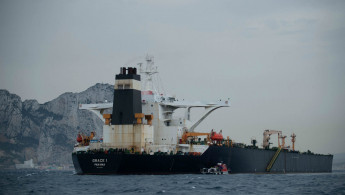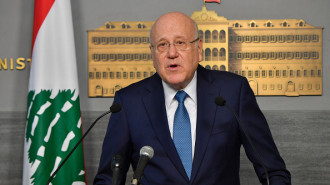Breadcrumb
Gibraltar shuns US detention request, releases Iranian oil tanker
Gibraltar's Supreme Court on Thursday ruled in favour of releasing an Iranian supertanker seized last month on suspicion of shipping oil to Syria in breach of EU sanctions, despite a US request to detain the vessel.
Chief Justice Anthony Dudley said that since Iran had guaranteed in writing that the destination of the Grace 1 would not be a country "subject to European Union sanctions... there are no longer reasonable grounds to suspect that the detention of the Vessel is required."
He added that the court had not received a written detention request from the United States despite Washington saying it applied for the seizure of the detained tanker in Gibraltar which is at the centre of a stand-off between Tehran and London.
"The US Department of Justice has applied to seize the Grace 1 on a number of allegations which are now being considered," the Gibraltar government said in a statement ahead of the decision on Thursday.
But Iran's top diplomat said the US attempt at "piracy" had failed after the Gibraltar court decision.
"Having failed to accomplish its objectives through its #EconomicTerrorism - including depriving cancer patients of medicine - the US attempted to abuse the legal system to steal our property on the high seas," Iranian Foreign Minister Mohammad Javad Zarif tweeted.
"This piracy attempt is indicative of Trump admin's contempt for the law."
Iran's ambassador to London called the verdict a "humiliating defeat" for the United States, his country's arch-enemy.
"Minutes ago... the tanker carrying Iranian oil was freed from illegal detention," Hamid Baeidinejad wrote on his Twitter account.
"The US with its last minute cowardly attempts sought to stop the tanker leaving detention which faced a humiliating defeat," he added.
The UK Navy detained the Iranian oil tanker in early July off the coast of Gibraltar.
The Grace 1 was suspected of transporting oil to Syria in contravention of EU sanctions, an allegation which Iran denies, calling the seizure "piracy".
The incident initiated an ongoing crisis in the Gulf's Strait of Hormuz, a vital world shipping route, with multiple tankers seized.
Just two week after the capture of the Grace 1, Iran's Revolutionary Guards seized a British tanker, the Stena Impero, accusing it of maritime violations.
The UK considers the seizure to have been an illegal retaliation.
British warship HMS Kenton Tuesday set sail for the Gulf to join a US-led mission aimed at protecting merchant vessels in the Strait of Hormuz.
The mission comes amid rising tensions in the region over the past few months.
A series of sabotage attacks on oil infrastructure and tankers and downed drones in the Gulf were followed by a buildup in US troop presence, among other stressors which have seen Saudi Arabia, the UAE, the US and allies lock horns with Iran.
"This deployment will reinforce security and provide reassurance for shipping," British Foreign Secretary Dominic Raab said in a statement.
"Our aim is to build the broadest international support to uphold freedom of navigation in the region, as protected under international law."
Raab insisted that despite the coalition the UK's approach to Iran had not changed.
"We remain committed to working with Iran and our international partners to de-escalate the situation and maintain the nuclear deal."
The US has been struggling to piece together an international coalition to protect cargo ships travelling through the Gulf, with allies concerned about being dragged into conflict with Iran.
The British announcement will be seen as a boost to US President Donald Trump as he continues to step up a campaign of "maximum pressure" against Tehran.
Last year, Trump withdrew the US from a landmark 2015 deal placing curbs on Iran's nuclear programme and began re-imposing sanctions, urging reluctant Western allies to follow suit.
London has sought to distance itself from his hard-line stance, insisting along with other European backers of the accord that it could still be salvaged, while trying to remain a steadfast US ally.
But it has found that balancing act increasingly difficult to maintain following a flare-up in relations with Iran over shipping.
Follow us on Twitter: @The_NewArab






![Anthony Blinken speech [Getty] Anthony Blinken speech [Getty]](/sites/default/files/styles/image_684x385/public/media/images/6263436E-8ACD-4D3C-9055-25A7BE79DD5A.jpg?h=d1cb525d&itok=fLHmHCRG)
 Follow the Middle East's top stories in English at The New Arab on Google News
Follow the Middle East's top stories in English at The New Arab on Google News


![Paula Yacoubian was verbally attacked by Salim Aoun during a parliamentary session [Getty]](/sites/default/files/styles/image_330x185/public/1150162486.jpeg?h=b9615360&itok=xysBxMUJ)